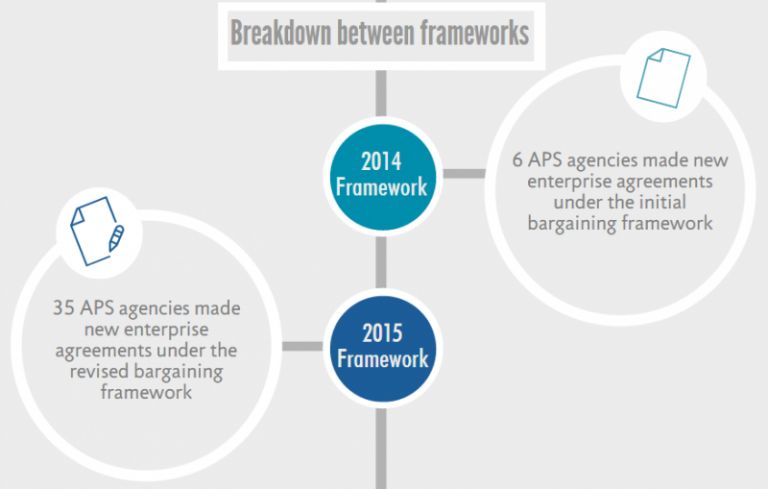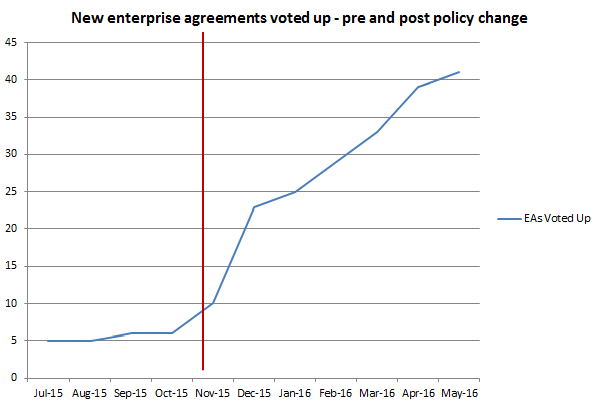Enterprise agreement bargaining
Bargaining for new enterprise agreements was ongoing in the Commonwealth public sector in the 2015/16 financial year.
Commonwealth public sector agencies negotiate their own enterprise agreements, within a policy framework established by the Government.
On 2 November 2015, the Government released the Workplace Bargaining Policy 2015 (the Policy), amending its original policy position and bargaining framework.
The primary objective of the Policy is to improve workforce flexibility, productivity and efficiency. These improvements will support agencies’ capability to deliver quality outcomes for Government, business and the community in a rapidly changing environment.
The new Policy modified requirements on enterprise agreement content and finding measurable productivity. The Policy provides agencies with the ability to negotiate remuneration increases of up to two per cent per annum, if affordable within existing budgets. The Policy seeks to remove restrictive terms which prevent normal management decision making. It does not require changes to employee terms and conditions, such as leave entitlements.
The release of the Policy led to a marked increase in
successful ballots. By the end of December 2015, the number of agreements voted up increased to 32. December and January saw a brief slowdown in bargaining and agreements going to ballot. This can be attributed to Christmas closedown and limited access to bargaining representatives during this period.
Figure 1: Breakdown between frameworks

Early 2016 saw a steady increase in enterprise agreements going to ballot, and from January to May 2016, a further 24 agreements were voted up. Bargaining was on hold during the 2016 Federal election, with the caretaker period beginning 9 May 2016. Consistent with the caretaker conventions, agencies did not take significant steps in the bargaining process during this period.
New enterprise agreements voted up – pre and post policy change
Learn more about this chart: view data for Figure 2.

As at 30 June 2016, 56 enterprise agreements had been voted up in 53 agencies. 41 of which were Australian Public Service agencies. The remaining 15 agreements apply to agencies that do not employ staff under the Australian Public Service Act 1999 (Cwth).
Analysis of results from the 2016 APS employee census shows that employees in agencies that have made new enterprise agreements are more engaged than employees in agencies still bargaining. The greatest difference in engagement results is in the level of agency engagement.
Employee engagement by enterprise agreement status, 2016
Learn more about this chart: view data for Figure 3.
Results from the 2016 employee census also show that employees in agencies where a new enterprise agreement has been made report much more positive perceptions of their financial and non-financial employment conditions.
Employee satisfaction with remuneration and employment conditions by enterprise agreement status, 2016
Learn more about this chart: view data for Figure 4.
The causal relationship between employee engagement and the making of new enterprise agreements is unclear. Employees with higher levels of engagement may more readily accept the proposed terms in new agreements offered by agency management.
Alternatively, the certainty of employment conditions and wage increases provided through new enterprise agreements could have led to staff feeling more engaged. Further analysis would be required to better understand the nature of this relationship.
In 2016-17, the APSC will continue to work with agencies to finalise bargaining across Commonwealth employment.



